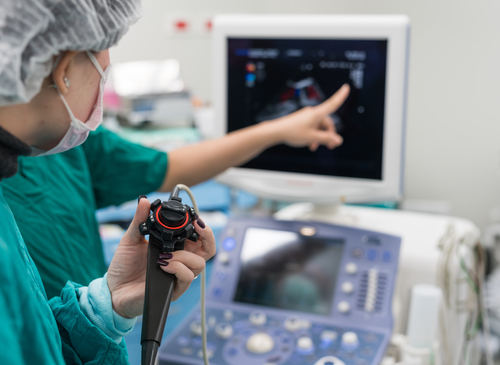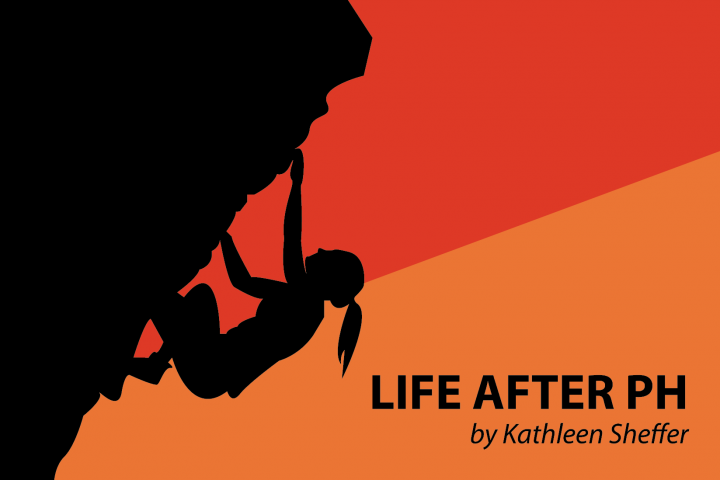Echocardiograms Are an Emotional Experience After PH and CHD

Last week I went in for a cardiac ultrasound (I call this exam an echo). I’ve probably had hundreds of them in my life, but since my heart-lung transplant, echoes are more emotional than ever.
It’s not because I’m afraid of the results. I’m lying still and quiet on a table, watching my valves open and close on a screen, red and blue blood exchanging in real time. It can be a meditative experience during which I am especially aware of my new heart. Sometimes I tear up. OK, fine, it’s every time.
Guided by an experienced technician, a cardiology fellow performed my exam last Wednesday. Normally I’m just lying there with one silent person moving goop (that’s the technical term) around my chest. Instead, I listened as the technician gave the fellow tips aloud. She advised him on the position of the probe, and directed my breathing patterns to improve the quality of the picture — truly fascinating stuff to me.
The technician pointed out how strong and young my heart looked. I forget which part of the heart tipped her off to that (oops), but it was nice to hear. Knowing my anonymous donor was in their 50’s has given me some anxiety in the past. Her remarks confirmed what my doctors have assured me: My transplanted heart has remodeled and adapted to my 25-year-old body.
I also learned that my heart is slightly askew in my chest. The technician told the fellow to expect that after a transplant. I guess it makes sense, but I never thought about that. I suppose I try not to spend lots of time thinking about the maneuvering of the organs in my open chest. And yet, here we are.
Pre-transplant, I had a complicated heart. Enlarged and with congenital heart defect (CHD), it usually took a technician an hour to take the pictures, and then they brought in a doctor to do some more imaging. Wednesday’s echo was longer than normal because of the training that was happening. Nevertheless, it was under an hour and uneventful.
The Pulmonary Hypertension News forums are a place to connect with other patients, share tips and talk about the latest research. Join today!
Nearly two and a half years later, it’s still novel to me to have an anatomically correct heart. Born with transposition of the great arteries, my pulmonary artery and aorta were switched in my birth heart, the blood rerouted through a baffle created during a Senning procedure (read more about that here).
Sure, I miss the confusion on the faces of new doctors who haven’t been prepped about my condition. I miss showing off the novelty of my heart’s rare defect corrected by a procedure surgeons haven’t performed for at least 20 years. Not so much, though. It’s a relief to be less complicated.
At a party last weekend, friends and I discussed the Apple Watch’s new ECG feature. This article explains the monitor is meant for healthy adults to be able to detect irregular rhythms, rather than track worsening heart failure and the like. This is a disappointment to PH and CHD patients, but I hope to be able to try it out. I have a healthy heart in a young adult body! That remains mind-boggling to me as I type it.
I thought I’d really miss the heart I had in my chest for 23 years. Instead, I’m loving getting to know this 50-something recycled heart. I hope to keep it pumping in my chest even longer than my first heart.
***
Note: Pulmonary Hypertension News is strictly a news and information website about the disease. It does not provide medical advice, diagnosis, or treatment. This content is not intended to be a substitute for professional medical advice, diagnosis, or treatment. Always seek the advice of your physician or other qualified health provider with any questions you may have regarding a medical condition. Never disregard professional medical advice or delay in seeking it because of something you have read on this website. The opinions expressed in this column are not those of Pulmonary Hypertension News or its parent company, Bionews Services, and are intended to spark discussion about issues pertaining to pulmonary hypertension.









Amy breunig
No mention of being grateful to the heart donor of donor family
Kathleen Sheffer
I’m sorry if I offended you by not spelling out my gratitude in this piece. I’ve reread it and feel that it’s strongly implied by my awe at the wonders of this new heart. I encourage you to read other posts that are specifically focused on my gratitude.
Carole Domasco
I'm so happy for you. For certain you probably think of the heart donor and those who loved that person.
I'm sure you are forever grateful to them. No need to say it. May God bless you with many healthy years to come.
Kathleen Sheffer
Thank you so much, Carole! I think of my donor and their family all the time and have written them four personal letters of gratitude in the past three years. Every day I’m working to honor their priceless gift.